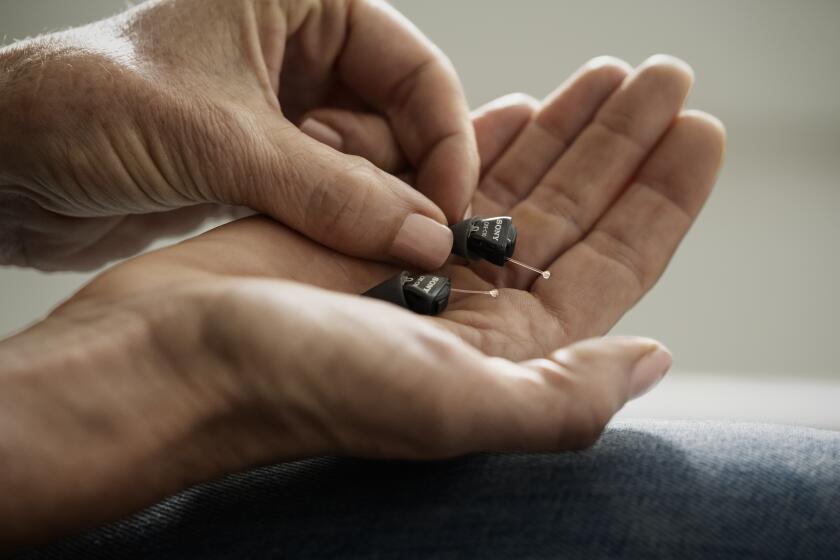Study Clears Filtered Coffee in Brewing Debate : Health: America’s cup of choice does not raise levels of cholesterol in the blood, Dutch scientists say.
If the decision to down a second cup of coffee is beginning to seem as treacherous to your health as scarfing a slab of well-marbled beef, take heart: Now comes word that filtered coffee, America’s brew of choice, has no effect on levels of cholesterol in the blood.
That is the conclusion of a team of Dutch researchers who compared the effects of filtered coffee and a European method of boiling coffee in a thermos. After nine weeks, filtered-coffee drinkers’ cholesterol levels were unchanged. The boiled-coffee drinkers’ levels had crept up 10%.
Precisely why that might be so remains a mystery, the researchers report today in the New England Journal of Medicine. But their finding is considered good news in the United States, a country where filtering, also known as “the drip method,” is all the rage.
These happy tidings for coffee lovers comes amid a welter of conflicting reports on the health hazards of everyone’s favorite vice: Caffeine is bad; no, decaffeination is bad; no, it’s the fats in coffee beans that are to blame; no, coffee isn’t bad after all.
Just last week, researchers at Stanford University reported that decaf, not caf, raised so-called “bad cholesterol” levels in middle-aged men. The week before, another Dutch study presented in Houston implicated certain fatty compounds produced in boiling coffee.
“At the moment, there’s a lot of evidence to suggest that coffee and cholesterol are linked in some fashion. But how they are linked is unclear,” said Dr. Basil Rifkind, chief of lipid metabolism and atherogenesis at the National Heart, Lung and Blood Institute.
“If you ask me should people change their coffee-drinking habits, I don’t think so, not yet,” Rifkind said. “The usual Solomonic wisdom is that people shouldn’t drink too much coffee in any case. . . . But I wouldn’t go any further than that.”
About 52.5% of all Americans over age 10 drink coffee, according to the National Coffee Assn. Average consumption is 3 1/3 cups a day and the method of choice is filtering, said the association’s George E. Boecklin, a five-cup-a-day man (filtered or freeze-dried).
In Europe and Scandinavia, by contrast, many coffee drinkers boil their jo, pouring scalding water over roughly ground beans in a thermos. Such differences have left researchers wondering whether the brewing method might influence the effects of coffee on health.
Early suggestions that coffee might be bad for the heart arose from long-term studies of heart disease among the general population. While people who experienced heart attacks seemed to drink more coffee than others, it was unclear whether the coffee was to blame.
Perhaps the problem was some other bad habit of coffee drinkers--say, smoking cigarettes or eating too much Danish pastry. But even when those factors were taken into account, researchers still detected links between heart disease and coffee.
They then went on to examine the cholesterol levels of people who said they had drunk a lot of coffee and people who said they had not. The results were conflicting. But several Scandinavian studies suggested a strong link between high cholesterol and coffee.
To examine that finding more closely, Drs. Annette A. A. Bak and Diederick E. Grobbee of Erasmus University in Rotterdam studied 107 healthy young men and women. They were divided into three groups--drinkers of filtered coffee, boiled coffee, no coffee.
After nine weeks in which the coffee groups drank four to six cups a day, the researchers found no change in the cholesterol levels of the no-coffee and filtered-coffee groups. But they did find a 10% rise in the cholesterol levels of the boiled-coffee group.
Specifically, what increased was low-density lipoprotein cholesterol, the so-called bad form of the fat-like substance, which can build up in the arteries. Narrowed arteries can lead to blockages which, in turn, can interrupt blood flow and cause a heart attack.
“In conclusion . . . our findings suggest that the consumption of filtered coffee does not affect serum lipid levels,” the researchers wrote. “The consumption of boiled coffee, however, has a considerable effect in raising cholesterol levels.”
Coffee industry officials called the report a vindication of America’s coffee habit.
“We never advocate boiling coffee to begin with,” sniffed Lawrence D. Hayes, president of the Specialty Coffee Assn. of America. “The specialty industry advises people to take their percolators and throw them out. Because that’s the best way to boil coffee.”
The researchers speculated that the effect of boiled coffee on cholesterol might be traceable to “active substances” released during preparation. By leaving coffee grounds exposed to hot water for a longer time, boiling might pose a greater health risk.
Another theory concerns the filter paper itself: If some active substance is to blame, perhaps it is absorbed by the paper or left behind by “selective filtering” because of the size of the particles, the researchers suggested.
Because the precise way in which coffee influences cholesterol remains unclear, the researchers warned that their findings “may be relevant for the products of similar methods, such as percolated coffee, camp coffee and Turkish coffee.”
Other researchers said Wednesday that they were not surprised by the new findings but advised caution in their interpretation.
Andrea LaCroix, an epidemiologist at the University of Washington who published a paper in 1986 linking heavy coffee consumption to coronary heart disease, emphasized that much remains to be learned about the risks that coffee poses for the human heart.
In light of that ambiguity, and the conflicting reports surfacing in recent weeks, LaCroix urged that people not overestimate the influence of coffee on the heart.
“If people are concerned about their risk of heart disease, there are well-known areas for making life style changes,” LaCroix said. “Those include stopping smoking, making sure your blood pressure is within normal limits and likewise serum cholesterol.
“And if you still have energy after that, I would say the data are much more persuasive that increasing physical activity levels would be helpful, (rather) than changing your coffee consumption habits,” LaCroix said.



